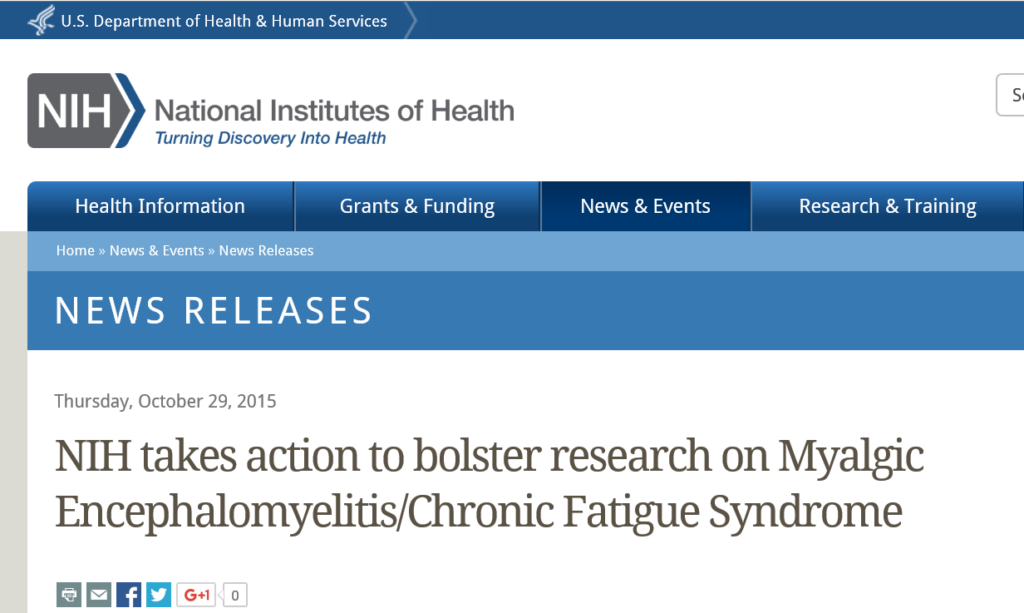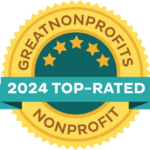 In a press release released on October 29, the NIH announced they have a new program to advance research into Myalgic Encephalomyelitis / Chronic Fatigue Syndrome. Under the leadership of the National Institute of Neurological Disorders and Strokes, we expect this new “research protocol at the NIH Clinical Center” will mean more research done by NIH and more NIH funding for researchers outside of the NIH.
In a press release released on October 29, the NIH announced they have a new program to advance research into Myalgic Encephalomyelitis / Chronic Fatigue Syndrome. Under the leadership of the National Institute of Neurological Disorders and Strokes, we expect this new “research protocol at the NIH Clinical Center” will mean more research done by NIH and more NIH funding for researchers outside of the NIH.
We were struck by the strong wording in the press release that shows a better understanding and interest in ME / CFS. It says this new initiative is to “intensely study individuals with ME / CFS” and that it will also re-invigorate the efforts of the existing Trans-NIH ME / CFS Research Working Group, which has already had representatives from many different NIH institutes looking for ways to fund and advance ME / CFS research.
In describing the disease, the release noted that the primary symptom is “systemic exertion intolerance,” where a person gets sicker from any type of exertion. The NIH is basing this statement on the Pathways to Prevention (P2P) report of the disease and this year’s National Academy of Medicine (formerly Institute of Medicine) report, which even recommended the name of the disease be changed from focusing on fatigue to the hallmark symptom. (Our own ME / CFS Scientific Advisory Board director, Ronald W. Davis, PhD, served on the IOM committee.) Shifting the symptom focus to what is commonly called “post-exertional malaise” is in harmony with what patients have been saying for years.
The press release also describes ME / CFS as including “immune, neurological and cognitive impairment; sleep abnormalities; and dysfunction of the autonomic system, which controls several basic bodily functions.” This is in stark contrast to the psychosocial theories proposed by some and what used to be the thinking at the NIH.
How did this come about?
Many efforts and factors contributed to these exciting results: years of online advocacy (patients and their relatives), letters from congress members (such as California’s Congresswoman Anna G. Eshoo), organization representatives (such as ours and the Solve ME / CFS Initiative) having meetings with NIH officials, previous biological abnormalities found by other scientists, individuals at government agencies advocating from within, news media coverage, recommendations by the Chronic Fatigue Syndrome Advisory Committee and the sacrifices of those who serve on that committee, and the P2P report done by the NIH through an independent group, and the report from the IOM.
So we congratulate all, especially those very sick individuals who use their limited energy in emails, petitions, speaking at government meetings, submitting comments when requested and more. Your work is making a difference!
How does this affect OMF research?
Some are asking if our foundation and the END ME / CFS Project will change in response to this announcement. We note that the NIH new initiative will be at their clinical center, and this will likely be more focused on the 75% who have enough function to come to the center. As most know, our End ME / CFS Project’s first phase is the ME / CFS Severely Ill-BIG DATA Study that is looking for biomarkers in the sickest of the sick, because biological abnormalities should be stronger in these patients. Our current efforts will continue so that what we’re doing can complement the new NIH initiative. We will continue discussions with our contacts at the NIH to look for future opportunities that will maximize ME / CFS research results.


